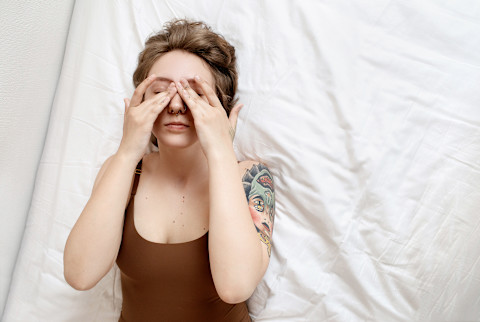Research Finds Depression To Be The Biggest Risk Factor For Insomnia

Everyone struggles with a bad night of sleep once in a while, but when it becomes a chronic issue, insomnia can cause a lot of other health problems.
Researching the biggest risk factors for insomnia
For this study, researchers wanted to identify various risk factors for insomnia using machine learning and a retrospective, cross-sectional cohort study.
Looking at data from nearly 8,000 middle-aged participants, machine learning assessed everything from mental health, to physical health, to lifestyle factors as they related to sleep disorders.
And based on their findings, depression was the biggest risk factor for insomnia, with 31.1% of participants with insomnia also struggling with depression. Age and exercise were the next most significant risk factors.
As study author Samuel Y. Huang M.D. explains in a news release, “What sets this study on the risk factors for insomnia apart from others is seeing not only that depressive symptoms, age, caffeine use, history of congestive heart failure, chest pain, coronary artery disease, liver disease, and 57 other variables are associated with insomnia, but also visualizing the contribution of each in a very predictive model.”
What to do about it
While more research needs to be done to further explain the connection between insomnia and depression, it's clear that sleep and mental health have an interwoven relationship.
Talk to your physician and/or a mental health professional if you're experiencing insomnia and depression to figure out the best course of action for improving your mental health—and getting more sleep.
To that end, the essential sleep rules like going to bed and waking up at the same time every day, are a good place to start—along with avoiding caffeine and alcohol too close to bed, which can impact sleep quality.
It may also be worthwhile to consider opting for a quality sleep supplement with ingredients like magnesium and pharmaGABA, which are research-backed to help regulate circadian rhythm and improve sleep quality. (Here are nine of our favorites, all vetted by a nutrition scientist.)
And for other ways to support your mental and sleep health, be sure to get natural light as soon as you wake up, aim to move your body each day, try to eat and workout at the same times every day, and find healthy ways to manage your emotions.
The takeaway
Sleep and mental health go hand in hand, so it's no surprise that people who struggle with insomnia may likely also struggle with depression. As we understand more and more about the connection between sleep and mental health, consider this one more reason to make sure you're minding both.
